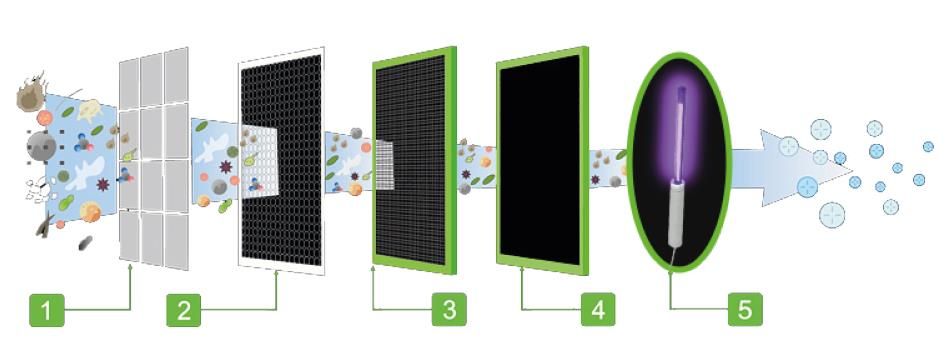Healthy air in classrooms
How schools become corona-free
Corona viruses like to spread well through the air. Especially when there are many people in a room - like at school. There's only one thing that helps: the air must be cleaned. But how?
The coronavirus is insidious. It can be transmitted even without personal contact. And it does so through the air, via aerosols. Every person loses the small particles when exhaling, speaking, singing, laughing or swearing. Infected people thus release the viruses into the air - and this is where the danger lies. Especially in classrooms.
For aerosol expert Michael Riediker (51), it's clear: Something has to happen! "The schools have to upgrade. I warned about the aerosol danger a year ago. But nothing was done. Now again a winter long durchseuchen, I think it's not a good idea." The lives of teachers and students need to be protected, he said.
The reason for the concern of the professor of risk analysis and director of the Swiss Center for Occupational and Environmental Health: aerosols can remain suspended in the air for hours. "The small particles rise to the top and then spread around the room. And so, for example, a classroom gradually becomes fogged with aerosols." The best way to think of it, he says, is like a room full of smokers. It doesn't take long for the room to fill up with smoke. It is exactly the same with aerosols.
Air filter protection is not a luxury
To make the particles disappear, you should ventilate well every 15 minutes. Even better: ventilation systems. Gerhard Scheuch (65) agrees. The physicist has been studying aerosols for years. "The more measures, the better. The Society for Aerosol Research recommends using filters in schools. Every virus particle that is eliminated by filters does not have to be inhaled," the German tells Blick.
And this protection is not a luxury. You don't have to buy the most expensive devices. "There are already effective mobile Hepa filters available for the equivalent of 400 francs, which can remove 99 percent of the viruses from the room air. Two filters per classroom should be enough." With Hepa filters, the air is passed through a thick fleece mat, he said. There, the aerosols bounce against a fiber and stick. Result: "The particles don't stand a chance there."
You have to change the mats after one or two years. The devices indicate when this needs to be done. Replacing the mat costs around 35 francs, Scheuch explains.

Virus load in the room is crucial
There would also be filters with UV lamps. "The viruses are even rendered harmless there. But I think that is superfluous. The devices are more expensive than Hepa filters, and in the end it doesn't matter whether the viruses stick to a mat or are eliminated completely. In either case, the virus particle can no longer be inhaled by humans. And that's what it's all about."
When choosing one, it is important to make sure that enough air volume is cleaned, says Ernest Weingartner (56), professor of measurement and sensor technology at the University of Applied Sciences Northwestern Switzerland.
The decisive factor is the virus load in the room. It is therefore of no use if a system for a large room can only clean small amounts of air. The small part is cleaned well, but the remaining aerosols can spread further in the room.
Air filter system is tested in Lenzburg school
Ideally, there is no mixing of old and new air during cleaning. "We are currently experimenting with a system in a school in Lenzburg in the canton of Aargau. The air is extracted via the ceiling, cleaned via a filter and then returned to the room via the floor." This guarantees that there is no mixing. Such a system, however, is associated with a complex installation."
Costly or not. Aerosol experts agree: schools must respond - and quickly. To put an end to the Corona ruckus in the classrooms.
German students can breathe easy
Germany is moving forward with the acquisition of Corona air filters: in mid-July, the government decided to make a total of 200 million euros available for the purchase of the devices. Federal states such as Bavaria (50 million) and Baden-Württemberg (60 million euros) had previously spoken their own funds.
Around 8,000 air filters are ready in Berlin schools alone at the end of the vacations - 3,000 more devices are to follow. Since these are only sufficient for about half of all classrooms, there is still a lot of criticism. The general tenor is that the procurement of air filters is progressing far too slowly.
In eastern Germany, on the other hand, there is no public funding at all. Apparently, people in states such as Thuringia and Saxony-Anhalt are not convinced of the cost-benefit ratio. Instead, they want to stick to regular airing - and at the same time hope for progress in the vaccination campaign and a levelling off of the pandemic.
In Austria, too, there has not yet been a clear commitment to filter devices. Although they are provided for in the protection concepts, there is a lack of funding. So far, the Austrian government has only made ten million euros available. This is probably only a drop in the bucket.
In the plans of neighboring France and Italy, air filters also do not play a significant role at present.
Source: Blick, published on 09.08.2021